Chile national football team
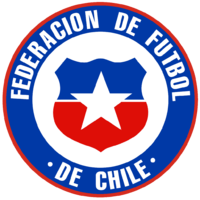 | |||||||||||
| Nickname(s) | La Roja (The Red One) | ||||||||||
|---|---|---|---|---|---|---|---|---|---|---|---|
| Association | Federación de Fútbol de Chile (FFCH) | ||||||||||
| Confederation | CONMEBOL (South America) | ||||||||||
| Head coach | Juan Antonio Pizzi | ||||||||||
| Captain | Claudio Bravo | ||||||||||
| Most caps | Claudio Bravo (110) | ||||||||||
| Top scorer | Marcelo Salas (37) | ||||||||||
| Home stadium | Estadio Nacional | ||||||||||
| FIFA code | CHI | ||||||||||
| |||||||||||
| FIFA ranking | |||||||||||
| Current |
4 | ||||||||||
| Highest | 3 (April–May 2016) | ||||||||||
| Lowest | 84 (December 2002) | ||||||||||
| Elo ranking | |||||||||||
| Current |
5 | ||||||||||
| Highest | 2 (July 2016) | ||||||||||
| Lowest | 60 (April 2003) | ||||||||||
| First international | |||||||||||
|
(Buenos Aires, Argentina; 27 May 1910) | |||||||||||
| Biggest win | |||||||||||
|
(Santiago, Chile; 29 August 1979) (Viña del Mar, Chile; 4 January 1997)[1] (Santa Clara, United States; 18 June 2016) | |||||||||||
| Biggest defeat | |||||||||||
|
(Rio de Janeiro, Brazil; 17 September 1959) | |||||||||||
| World Cup | |||||||||||
| Appearances | 9 (first in 1930) | ||||||||||
| Best result | Third place, 1962 | ||||||||||
| Copa América | |||||||||||
| Appearances | 38 (first in 1916) | ||||||||||
| Best result | Champions, 2015 and 2016 | ||||||||||
| Confederations Cup | |||||||||||
| Appearances | 1 (first in 2017) | ||||||||||
| Best result | TBD, 2017 | ||||||||||
Medal record
| |||||||||||
The Chile national football team (Selección de fútbol de Chile) represents Chile in all major international football competitions and is controlled by the Federación de Fútbol de Chile which was established in 1895. The team is commonly referred to as La Roja ("The Red One").[3][4][5] They have appeared in nine World Cup tournaments and were hosts of the 1962 FIFA World Cup where they finished in third place, the highest position the country has ever achieved in the World Cup. Since the mid to late 1960s, the Elo ratings ranks Chile among the 25 strongest football teams in the world.
Chile are the reigning Copa América champions; after winning 2015 Copa América on home soil, it successfully defended their title in the United States in the Copa América Centenario in 2016. Prior to this, Chile had been runners-up in the competition on four occasions. As a result of winning the 2015 Copa América, they qualified for the 2017 FIFA Confederations Cup.
History
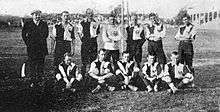
The Federación de Fútbol de Chile is the second oldest South American federation, having been founded in Valparaíso on June 19, 1895.[7]
Chile is one of the four founding member nations of CONMEBOL. Together with Argentina, Brazil, and Uruguay, the four competed in the first South American Championship, later to be renamed the Copa América, in 1916. On October 12, 1926, Chile made the first corner-kick goal in Copa América history in a match against Bolivia.
Chile was one of the thirteen national teams that competed in the inaugural World Cup in 1930. The team started off well, beating Mexico and France without conceding a goal. A 3–1 loss to Argentina in the final game left the Chilean team in second place within the group, eliminating it from the tournament. In the 1950 World Cup, Chile defeated the United States, 5–2, but nevertheless was eliminated in the first round.
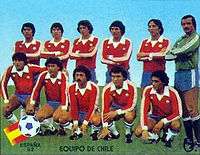
The best Chilean result in the World Cup was third place in 1962, as the host nation. Chile lost 4–2 to eventual champion Brazil in a semi-final but went on to defeat Yugoslavia 1–0 to earn third place. Chilean players made two World Cup firsts: the first player to miss a World Cup penalty kick was the Chilean Guillermo Subiabre, in a 1930 FIFA World Cup match against France,[8] and Carlos Caszely of Chile became the first player to be sent off with a red card, during a match against West Germany at the 1974 World Cup.
On July 19, 2007, the Chilean Football Federation banned six of the national team players, because of "internal indiscipline" during the Copa América tournament, for 20 international matches each and none of the players will ever be allowed to captain the national team. The players banned were captain Jorge Valdivia, defenders Álvaro Ormeño, Rodrigo Tello, Jorge Vargas, Pablo Contreras and striker Reinaldo Navia.[9] Nelson Acosta's resignation as manager came after Chile were knocked out of the 2007 Copa América. Chile had qualified to the quarter-finals after a 3–2 win against Ecuador, and a 0–0 draw against Mexico. But two losses, one of those being a 6–1 defeat against Brazil, sealed Acosta's fate. Former Argentina manager Marcelo Bielsa was given the task of becoming the Chile national team manager in preparation for the 2010 World Cup qualifiers.[10]
On October 16, 2008, Chile beat Argentina 1–0 for the first time in a qualifying competition, making history. Marcelo Bielsa was acclaimed for this accomplishment by both Chilean and Argentinian people. This match was seen as one of the reasons that ended Alfio Basile's tenure as Argentina's coach.
After finishing in second place of the CONMEBOL qualifiers for the 2010 FIFA World Cup held in South Africa and reaching the round of 16 at the tournament, head coach Marcelo Bielsa extended his contract with the Chilean national team until 2015. Bielsa stated that he would leave his position if Jorge Segovia were elected as President of the Chilean Football Board. He followed through on this threat, despite Segovia's election being annulled, and resigned in February 2011. Claudio Borghi then became Chile's manager in March 2011.
After a string of bad performances and harsh criticisms, Claudio Borghi stepped down as Chile's manager in November 2012. A new manager, Jorge Sampaoli, was appointed in December 2012. A disciple of Marcelo Bielsa, Jorge Sampaoli broke new records for La Roja by winning 10, drawing 3, and losing only 3 of 15 games as the head of the Chilean national team.
With Sampaoli, Chile were able to qualify for 2014 FIFA World Cup, reaching to the round of 16, where Chile lost to Brazil in penalties.
In the 2015 Copa América, Chile won their first game against Ecuador, with 2–0 being the score. In their second game, Chile drew against Mexico. Chile advanced to the knockout stage as Group A winners with 7 points and most goals scored of any team in the tournament (10). Then they beat Uruguay in the quarterfinals and Peru in the semifinals. In the final, Chile defeated Argentina on penalties (4–1) after a 0–0 draw, to win their first Copa America title.
In January 2016, just six months after winning the 2015 Copa America, Jorge Sampaoli stepped down as Chile's manager.[11] A new manager, the argentinean Juan Antonio Pizzi, was appointed at the end of the same month.[12]
Kits
The team kit consists of a red jersey, blue shorts, and white socks. The away jersey features a white jersey, white shorts, and blue socks. The color scheme of red, white, and blue that was featured in the 1947 South American Championship, the precursor of the Copa América, has remained in place since. In 2016, red shorts were introduced as an option for the first time.
In August 2010, Puma acquired the contract to be the official kit supplier for the Chilean team from 2011–2015, paying US$ 3 million per year, also providing referees' kits and balls for domestic club competitions. The previous kit supplier, from 2004 to 2010 including the 2010 World Cup, was Brooks Sports [13]
Puma company ended its link after the Copa America 2015 with the tender for the new brand that will outfit the team since August 2015. This procedure was won by the American company Nike. Thus, the brand will be responsible for all the costumes of the selection once the Copa America ends. The contract with Nike last until the 2022 FIFA World Cup.[14]
|
1910–1941 |
1941–1947 |
since 1947 |
World Cup 1974 Home |
World Cup 1982 Home |
|
Copa América 1993 Home |
World Cup 1998 Home |
2003–2006 |
2007–2009 |
Stadium
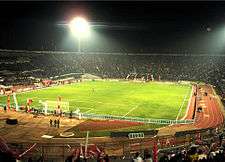
The Chilean national team plays their qualifying matches at the Estadio Nacional Julio Martínez Prádanos located in Santiago, Chile and can be found at the commune of Ñuñoa. The construction of the stadium began in February 1937, and opened on 3 December 1938. The current official registered capacity is of 49,000 spectators, but has surpassed the 75,000 mark on many occasions when the match is of high demand.[15] An example would be the 1962 FIFA World Cup semi-final match Chile vs. Brazil, where over 76,000 spectators viewed the game. The maximum attendance ever was 85,262 on December 26, 1962, for a game between Universidad Católica and Universidad de Chile.
It has hosted four Copa América finals, the final of the 1962 FIFA World Cup and the final to the 1987 FIFA World Youth Championship.
Rivalries
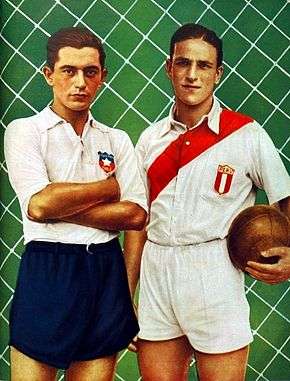
Chile's main football rivalry is with neighbouring Argentina. Although historically it has been a one sided rivalry, with Argentina winning the majority of times, that has changed in recent years with Chile winning consecutive Copa Americas against Argentina. Due to historic reasons and their shared border, Chilean fans will always consider games against Argentina as the most exciting.
Chile maintains a rivalry with neighbouring Peru. The Chile–Peru football rivalry is known in Spanish as the Clásico del Pacífico ("Pacific Derby").[16] CNN World Sport editor Greg Duke ranks it among the top ten football rivalries in the world.[17] Chile first faced Peru in the 1935 South American Championship, prevailing 1–0.[18][19] They also both claim to have invented the bicycle kick; Peruvians call it the chalaca, while it is the chilena in Chile.[20] The rivalry has died down in recent years as Chile has become one of the strongest teams in South America while Peru has become one of the weakest.
Sponsors
- Coca-Cola (since 1962 FIFA World Cup)
- Entel (since 2003)
- Homecenter Sodimac (since 2007)
- Cerveza Cristal (since 2007)
- Mega (TV broadcaster of Chile's qualifying and friendly matches)
- Nike (since 2015)
- Itau Corpbanca (since 2015)
- Samsung (since 2011)
- Chery (since 2013)
- Cecinas PF (since 2012)
- Gillette (since 2012)
Managers
Players
Current squad
The following 26 players were called up for the 2018 FIFA World Cup qualification matches against Colombia on November 10 and Uruguay on November 15, 2016.[21][22][23][24]
Caps and goals updated as of November 15, 2016 after the match against Uruguay.
Recent call-ups
The following players have been called up in the last twelve months.
| Pos. | Player | Date of birth (age) | Caps | Goals | Club | Latest call-up |
|---|---|---|---|---|---|---|
| GK | Miguel Pinto | April 4, 1983 | 21 | 0 | v. | |
| GK | Paulo Garcés | August 2, 1984 | 1 | 0 | v. | |
| DF | Paulo Díaz | March 24, 1994 | 1 | 0 | v. | |
| DF | Igor Lichnovsky | March 7, 1994 | 1 | 0 | v. | |
| DF | Christian Vilches | July 13, 1983 | 2 | 0 | v. | |
| DF | René Meléndez | November 19, 1998 | 0 | 0 | v. | |
| DF | Felipe Campos | November 8, 1993 | 0 | 0 | Copa América Centenario PRE | |
| MF | Charles Aránguiz | April 17, 1989 | 53 | 7 | v. | |
| MF | Jorge Valdivia | October 19, 1983 | 73 | 7 | v. | |
| MF | Lorenzo Reyes | June 13, 1991 | 4 | 0 | v. | |
| MF | Matías Fernández | May 15, 1986 | 73 | 14 | v. | |
| MF | Rodrigo Millar | November 3, 1981 | 37 | 3 | v. | |
| MF | Adrián Cuadra | October 23, 1997 | 0 | 0 | v. | |
| MF | Ignacio Jara | February 11, 1996 | 0 | 0 | v. | |
| MF | Gabriel Suazo | August 9, 1997 | 0 | 0 | v. | |
| MF | Manuel Iturra | June 23, 1984 | 34 | 1 | Copa América Centenario PRE | |
| MF | Fernando Meneses | August 27, 1985 | 16 | 1 | Copa América Centenario PRE | |
| MF | Bryan Rabello | May 21, 1994 | 5 | 0 | Copa América Centenario PRE | |
| MF | Esteban Pavez | May 1, 1990 | 1 | 0 | Copa América Centenario PRE | |
| MF | Diego Valdés | January 30, 1994 | 1 | 0 | Copa América Centenario PRE | |
| FW | Edson Puch | September 4, 1986 | 15 | 2 | v. | |
| FW | Junior Fernandes | October 4, 1988 | 10 | 0 | v. | |
| FW | Mauricio Pinilla | February 4, 1984 | 45 | 8 | v. | |
| FW | Nicolás Maturana | April 8, 1993 | 0 | 0 | v. | |
| FW | Mark González | July 10, 1984 | 56 | 6 | Copa América Centenario | |
| FW | Ángelo Henríquez | April 13, 1994 | 9 | 2 | Copa América Centenario PRE | |
| FW | Marcos Bolados | February 28, 1996 | 0 | 0 | Copa América Centenario PRE | |
| FW | Marcelo Larrondo | August 16, 1988 | 0 | 0 | Copa América Centenario PRE | |
| FW | Jeisson Vargas | September 15, 1997 | 0 | 0 | Copa América Centenario PRE | |
- Notes
- INJ Withdrew from the squad due to injury
- PRE Preliminary squad
- SUS Withdrew from the squad due to suspension
Results and fixtures
2016
| March 24 2018 World Cup Q | Chile |
1–2 | |
Santiago, Chile |
|---|---|---|---|---|
| 20:30 (UTC−3) | Gutiérrez |
Report (FIFA) Report (CONMEBOL) |
Di María Mercado |
Stadium: Estadio Nacional Julio Martínez Prádanos Attendance: 44,500 Referee: Héber Lopes (Brazil) |
| March 29 2018 World Cup Q | Venezuela |
1–4 | |
Barinas, Venezuela |
|---|---|---|---|---|
| 19:00 (UTC−4.5) | Otero |
Report (FIFA) Report (CONMEBOL) |
Pinilla Vidal |
Stadium: Estadio Agustín Tovar Referee: Diego Haro (Peru) |
| May 27 Friendly | Chile |
1–2 | |
Viña del Mar, Chile |
|---|---|---|---|---|
| 19:00 (UTC−3) | Castillo |
Report | Donaldson Grant |
Stadium: Estadio Sausalito Attendance: 22,000 Referee: Raúl Orozco (Bolivia) |
| June 1 Friendly | Mexico |
1–0 | |
San Diego, United States |
|---|---|---|---|---|
| 19:00 (UTC−6) | Hernández |
Report | Stadium: Qualcomm Stadium Attendance: 65,000 Referee: Baldomero Toledo (United States) |
| June 6 Copa América Centenario | Argentina |
2–1 | |
Santa Clara, United States |
|---|---|---|---|---|
| 22:00 EDT (UTC−4) | Di María Banega |
Report (CONMEBOL) Report (CONCACAF) Report (FIFA) |
Fuenzalida |
Stadium: Levi's Stadium Attendance: 69,451 Referee: Daniel Fedorczuk (Uruguay) |
| June 10 Copa América Centenario | Chile |
2–1 | |
Foxborough, United States |
|---|---|---|---|---|
| 19:00 EDT (UTC−4) | Vidal |
Report (CONMEBOL) Report (CONCACAF) |
Campos |
Stadium: Gillette Stadium Attendance: 19,392 Referee: Jair Marrufo (United States) |
| June 14 Copa América Centenario | Chile |
4–2 | |
Philadelphia, United States |
|---|---|---|---|---|
| 20:00 EDT (UTC−4) | Vargas Sánchez |
Report (CONMEBOL) Report (CONCACAF) |
Camargo Arroyo |
Stadium: Lincoln Financial Field Attendance: 27,260 Referee: Roddy Zambrano (Ecuador) |
| June 18 Copa América Centenario | Mexico |
0–7 | |
Santa Clara, United States |
|---|---|---|---|---|
| 22:00 EDT (UTC−4) | Report (CONMEBOL) Report (CONCACAF) |
Puch Vargas Sánchez |
Stadium: Levi's Stadium Attendance: 70,547 Referee: Héber Lopes (Brazil) |
| June 22 Copa América Centenario | Colombia |
0–2 | |
Chicago, United States |
|---|---|---|---|---|
| 20:00 EDT (UTC−4) | Report (CONMEBOL) Report (CONCACAF) |
Aránguiz Fuenzalida |
Stadium: Soldier Field Attendance: 55,423 Referee: Joel Aguilar () |
| June 26 Copa América Centenario | Argentina |
0–0 (a.e.t.) (2–4 p) |
|
East Rutherford, United States |
|---|---|---|---|---|
| 20:00 EDT (UTC−4) | Report (CONMEBOL) Report (CONCACAF) |
Stadium: MetLife Stadium Attendance: 82,026 Referee: Héber Lopes (Brazil) |
||
| Penalties | ||||
| Messi Mascherano Agüero Biglia |
| September 1 2018 World Cup Q | Paraguay |
2–1 | |
Asunción, Paraguay |
|---|---|---|---|---|
| 20:00 UTC−4 | O. Romero Da Silva |
Report (FIFA) Report (CONMEBOL) |
Vidal |
Stadium: Estadio Defensores del Chaco Attendance: 25,000 Referee: Néstor Pitana (Argentina) |
| September 6 2018 World Cup Q | Chile |
3–0 Awarded[25] |
|
Santiago, Chile |
|---|---|---|---|---|
| 20:30 UTC−3 | Stadium: Estadio Monumental David Arellano Referee: Ricardo Marques (Brazil) |
| October 6 2018 World Cup Q | Ecuador |
3–0 | |
Quito, Ecuador |
|---|---|---|---|---|
| 16:00 UTC−5 | A. Valencia Ramírez Caicedo |
Report (FIFA) Report (CONMEBOL) |
Stadium: Estadio Olímpico Atahualpa Referee: Mauro Vigliano (Argentina) |
| October 11 2018 World Cup Q | Chile |
2–1 | |
Santiago, Chile |
|---|---|---|---|---|
| 20:30 UTC−3 | Vidal |
Report (FIFA) Report (CONMEBOL) |
Flores |
Stadium: Estadio Nacional Julio Martínez Prádanos Referee: Roddy Zambrano (Ecuador) |
| November 10 2018 World Cup Q | Colombia |
0–0 | |
Barranquilla, Colombia |
|---|---|---|---|---|
| 15:30 UTC−5 | Report (FIFA) Report (CONMEBOL) |
Stadium: Estadio Metropolitano Roberto Meléndez Referee: Wilton Sampaio (Brazil) |
| November 15 2018 World Cup Q | Chile |
3–1 | |
Santiago, Chile |
|---|---|---|---|---|
| 20:30 UTC−3 | Vargas Sánchez |
Report (FIFA) Report (CONMEBOL) |
Cavani |
Stadium: Estadio Nacional Julio Martínez Prádanos Referee: Enrique Cáceres (Paraguay) |
2017
| January 10 2017 China Cup | Chile |
v | TBC | Nanning, China |
|---|---|---|---|---|
| Stadium: Guangxi Sports Center |
| January 15 2017 China Cup | Chile |
v | TBC | Nanning, China |
|---|---|---|---|---|
| Stadium: Guangxi Sports Center |
| March 23 2018 World Cup Q | Argentina |
v | |
Buenos Aires, Argentina |
|---|---|---|---|---|
| Report (FIFA) Report (CONMEBOL) |
Stadium: Estadio Alberto J. Armando, Buenos Aires |
| June 18 2017 FIFA Confederations Cup | African Champion | v | |
Moscow, Russia |
|---|---|---|---|---|
| 21:00 (UTC+3) | Stadium: Otkrytiye Arena |
| June 22 2017 FIFA Confederations Cup | Germany |
v | |
Kazan, Russia |
|---|---|---|---|---|
| 21:00 (UTC+3) | Stadium: Kazan Arena |
| June 25 2017 FIFA Confederations Cup | Chile |
v | |
Moscow, Russia |
|---|---|---|---|---|
| 18:00 (UTC+3) | Stadium: Otkrytiye Arena |
| August 31 2018 World Cup Q | Chile |
v | |
|
| Report (FIFA) Report (CONMEBOL) |
| September 5 2018 World Cup Q | Bolivia |
v | |
|
| Report (FIFA) Report (CONMEBOL) |
| October 5 2018 World Cup Q | Chile |
v | |
|
| Report (FIFA) Report (CONMEBOL) |
| October 10 2018 World Cup Q | Brazil |
v | |
|
| Report (FIFA) Report (CONMEBOL) |
Records
Most capped players
|
Top goalscorers
|
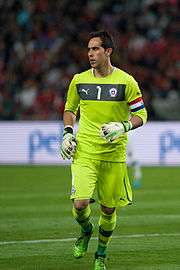 Claudio Bravo is the most capped player in the history of Chile with 110 caps. |
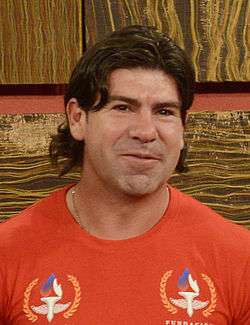 Marcelo Salas is the top scorer in the history of Chile with 37 goals. |
Competitive record
FIFA World Cup
Champions Runners-up Third Place Fourth Place
| FIFA World Cup record | ||||||||
|---|---|---|---|---|---|---|---|---|
| Year | Round | Position | Pld | W | D | L | GF | GA |
| Group Stage | 5th | 3 | 2 | 0 | 1 | 5 | 3 | |
| Withdrew | ||||||||
| Group Stage | 9th | 3 | 1 | 0 | 2 | 5 | 6 | |
| Did Not Qualify | ||||||||
| Third Place | 3rd | 6 | 4 | 0 | 2 | 10 | 8 | |
| Group Stage | 13th | 3 | 0 | 1 | 2 | 2 | 5 | |
| Did Not Qualify | ||||||||
| Group Stage | 11th | 3 | 0 | 2 | 1 | 1 | 2 | |
| Did Not Qualify | ||||||||
| Group Stage | 22nd | 3 | 0 | 0 | 3 | 3 | 8 | |
| Did Not Qualify | ||||||||
| Banned | ||||||||
| Round of 16 | 16th | 4 | 0 | 3 | 1 | 5 | 8 | |
| Did Not Qualify | ||||||||
| Round of 16 | 10th | 4 | 2 | 0 | 2 | 3 | 5 | |
| Round of 16 | 9th | 4 | 2 | 1 | 1 | 6 | 4 | |
| To be determined | ||||||||
| Total | Third Place | 9/22 | 33 | 11 | 7 | 15 | 40 | 49 |
Record by opponent
| FIFA World Cup matches (by team) | ||||||
|---|---|---|---|---|---|---|
| Opponent | Wins | Draws | Losses | Total | Goals Scored | Goals Conceded |
| 0 | 0 | 1 | 1 | 2 | 3 | |
| 0 | 0 | 1 | 1 | 1 | 3 | |
| 1 | 1 | 0 | 2 | 3 | 1 | |
| 0 | 1 | 1 | 2 | 1 | 2 | |
| 0 | 1 | 3 | 4 | 4 | 12 | |
| 0 | 1 | 0 | 1 | 1 | 1 | |
| 0 | 1 | 0 | 1 | 1 | 1 | |
| 0 | 0 | 1 | 1 | 0 | 2 | |
| 1 | 0 | 0 | 1 | 1 | 0 | |
| 0 | 0 | 3 | 3 | 1 | 7 | |
| 1 | 0 | 0 | 1 | 1 | 0 | |
| 1 | 1 | 1 | 3 | 4 | 4 | |
| 1 | 0 | 0 | 1 | 3 | 0 | |
| 0 | 0 | 1 | 1 | 0 | 2 | |
| 0 | 1 | 0 | 1 | 1 | 1 | |
| 1 | 0 | 1 | 2 | 3 | 3 | |
| 1 | 0 | 2 | 3 | 3 | 4 | |
| 2 | 0 | 0 | 2 | 4 | 1 | |
| 1 | 0 | 0 | 1 | 5 | 2 | |
| 1 | 0 | 0 | 1 | 1 | 0 | |
FIFA Confederations Cup
| FIFA Confederations Cup record | ||||||||
|---|---|---|---|---|---|---|---|---|
| Year | Round | Position | Pld | W | D | L | GF | GA |
| Did Not Qualify | ||||||||
| Qualified | ||||||||
| To be determined | ||||||||
| Total | ||||||||
Copa América
Champions Runners-up Third Place Fourth Place
| South American Championship record | ||||||||
|---|---|---|---|---|---|---|---|---|
| Year | Round | Position | Pld | W | D | L | GF | GA |
| Fourth Place | 4th | 3 | 0 | 1 | 2 | 2 | 11 | |
| Fourth Place | 4th | 3 | 0 | 0 | 3 | 0 | 10 | |
| Fourth Place | 4th | 3 | 0 | 0 | 3 | 1 | 12 | |
| Fourth Place | 4th | 3 | 0 | 1 | 2 | 2 | 4 | |
| Withdrew | ||||||||
| Fifth Place | 5th | 4 | 0 | 1 | 3 | 1 | 10 | |
| Withdrew | ||||||||
| Fourth Place | 4th | 3 | 0 | 0 | 3 | 1 | 10 | |
| Withdrew | ||||||||
| Third Place | 3rd | 4 | 2 | 1 | 1 | 14 | 6 | |
| Withdrew | ||||||||
| Did not participate | ||||||||
| Fourth Place | 4th | 3 | 0 | 0 | 3 | 2 | 7 | |
| Fifth Place | 5th | 5 | 1 | 1 | 3 | 12 | 13 | |
| Fourth Place | 4th | 4 | 1 | 0 | 3 | 8 | 12 | |
| Third Place | 3rd | 4 | 2 | 0 | 2 | 6 | 3 | |
| Sixth Place | 6th | 6 | 1 | 1 | 4 | 4 | 15 | |
| Third Place | 3rd | 6 | 4 | 1 | 1 | 15 | 5 | |
| Fifth Place | 5th | 5 | 2 | 0 | 3 | 8 | 11 | |
| Fourth Place | 4th | 7 | 4 | 1 | 2 | 14 | 13 | |
| Fifth Place | 5th | 7 | 2 | 1 | 4 | 10 | 14 | |
| Fourth Place | 4th | 6 | 3 | 1 | 2 | 10 | 10 | |
| Runners-up | 2nd | 5 | 3 | 1 | 1 | 19 | 8 | |
| Runners-up | 2nd | 5 | 3 | 0 | 2 | 11 | 8 | |
| Sixth Place | 6th | 6 | 1 | 1 | 4 | 9 | 17 | |
| Fifth Place | 5th | 6 | 2 | 1 | 3 | 9 | 14 | |
| Did not participate | ||||||||
| Third Place | 3rd | 5 | 2 | 2 | 1 | 8 | 6 | |
| Total | Runners-up | 22/29 | 171 | 33 | 15 | 55 | 166 | 219 |
| Copa América record | ||||||||
|---|---|---|---|---|---|---|---|---|
| Year | Round | Position | Pld | W | D | L | GF | GA |
| Group Stage | 6th | 4 | 1 | 1 | 2 | 7 | 6 | |
| Runners-up | 2nd | 9 | 4 | 3 | 2 | 13 | 6 | |
| Group Stage | 5th | 4 | 2 | 1 | 1 | 8 | 2 | |
| Runners-up | 2nd | 4 | 3 | 0 | 1 | 9 | 3 | |
| Group Stage | 5th | 4 | 2 | 0 | 2 | 7 | 5 | |
| Third Place | 3rd | 7 | 3 | 2 | 2 | 11 | 6 | |
| Group Stage | 7th | 3 | 1 | 0 | 2 | 3 | 4 | |
| Group Stage | 9th | 3 | 0 | 1 | 2 | 3 | 8 | |
| Group Stage | 9th | 3 | 0 | 0 | 3 | 1 | 5 | |
| Fourth Place | 4th | 6 | 2 | 1 | 3 | 8 | 7 | |
| Quarter-Finals | 7th | 4 | 2 | 0 | 2 | 5 | 5 | |
| Group Stage | 10th | 3 | 0 | 1 | 2 | 2 | 4 | |
| Quarter-Finals | 8th | 4 | 1 | 1 | 2 | 4 | 11 | |
| Quarter-Finals | 5th | 4 | 2 | 1 | 1 | 5 | 4 | |
| Champions | 1st | 6 | 4 | 2 | 0 | 13 | 4 | |
| Champions | 1st | 6 | 4 | 1 | 1 | 16 | 5 | |
| Total | 2 Titles | 15/15 | 74 | 31 | 15 | 28 | 115 | 85 |
Summer Olympics Record
Gold Silver Bronze
| Olympics Record | ||||||||
|---|---|---|---|---|---|---|---|---|
| Year | Host | Result | GP | W | D | L | GS | GA |
| 1896 | | No Football Tournament | ||||||
| 1900 | | Did Not Participate | ||||||
| 1904 | | |||||||
| 1908 | | |||||||
| 1912 | | |||||||
| 1920 | | |||||||
| 1924 | | |||||||
| 1928 | | Consolation Final | 3 | 1 | 1 | 1 | 7 | 7 |
| 1932 | | No football tournament | ||||||
| 1936 | | Withdrew | ||||||
| 1948 | | Did Not Participate | ||||||
| 1952 | | First Stage | 1 | 0 | 0 | 1 | 4 | 5 |
| 1956 | | Did Not Participate | ||||||
| 1960 | | Did Not Qualify | ||||||
| 1964 | | |||||||
| 1968 | | |||||||
| 1972 | | |||||||
| 1976 | | |||||||
| 1980 | | |||||||
| 1984 | | Quarter-finals | 4 | 1 | 2 | 1 | 2 | 2 |
| 1988 | | Did Not Qualify | ||||||
| 1992 | | |||||||
| 1996 | | |||||||
| 2000 | | Third Place | 6 | 4 | 0 | 2 | 14 | 6 |
| 2004 | | Did Not Qualify | ||||||
| 2008 | | |||||||
| 2012 | | |||||||
| 2016 | | |||||||
| 2020 | | To Be Determined | ||||||
| Total | 4/24 | 14 | 6 | 3 | 5 | 27 | 20 | |
Pan American Games
| Pan American Games record | ||||||||
|---|---|---|---|---|---|---|---|---|
| Year | Round | Position | Pld | W | D | L | GF | GA |
| 1951 | Third place | 3rd | 4 | 1 | 2 | 1 | 8 | 6 |
| 1955 and 1959 | Did not participate | |||||||
| 1963 | Third place | 3rd | 4 | 2 | 1 | 1 | 12 | 6 |
| 1967 to 1979 | Did not participate | |||||||
| 1983 | Round 1 | 3 | 1 | 2 | 0 | 3 | 2 | |
| 1987 | Runners-up | 2nd | 5 | 2 | 2 | 1 | 6 | 6 |
| 1991 | Did not participate | |||||||
| 1995 | Quarterfinals | 4 | 1 | 1 | 2 | 3 | 6 | |
| 1999 to 2011 | Did not participate | |||||||
| Total | Runners-up | 5/15 | 20 | 7 | 8 | 5 | 32 | 26 |
Honours
- FIFA World Cup
- Third place (1): 1962
- South American Championship / Copa América
- Panamerican Championship
- Runners-up (1): 1952
Notes
- In 2010, Chicago-based rock band Manwomanchild released the song "Chile La Roja" in support of Chile's 2010 World Cup team.[30][31][32]
See also
- Chile women's national football team
- Chile national under-20 football team
- Chile national under-17 football team
- South American Footballer of the Year
References
- ↑ Fifa.com, Comparison of Armenia and Chile
- ↑ After 1988, the tournament has been restricted to squads with no more than 3 players over the age of 23, and these matches are not regarded as part of the national team's record, nor are caps awarded.
- ↑ "Uno a uno de la Roja: Buenas individualidades pero falta juego colectivo". EMOL (El Mercurio On-Line). February 29, 2012. Retrieved March 6, 2012.
- ↑ Mateo, Miguel Ángel (May 31, 2010). "El porqué de 'la Roja'". El Mundo (España). Retrieved September 15, 2011.
- ↑ "Sudáfrica será el octavo Mundial para la 'Roja'". El Mercurio de Antofagasta. March 6, 2012. Retrieved October 11, 2009.
- ↑ IFFHS, ed. (2010). "Chile: Full "A" internationals (1910)". IFFHS. Retrieved 9 December 2010.
- ↑ Confederación Sudamericana de Fútbol
- ↑ (Spanish) http://revista.guachacas.cl/Epi_mundial30.html
- ↑ "Chile blacklist six Copa players". BBC Sport. 11 July 2007. Retrieved 2007-07-12.
- ↑ "Chile name Bielsa as new coach". Retrieved 9 July 2015.
- ↑ "Jorge Sampaoli quits as Chile manager after row with new president". The Guardian. 19 January 2016. Retrieved 2016-11-22.
- ↑ "Juan Antonio Pizzi named new Chile coach to 2018 World Cup". Dailymail. 30 January 2016. Retrieved 2016-11-22.
- ↑ (Spanish) http://www.emol.com/noticias/deportes/detalle/detallenoticias.asp?idnoticia=251738
- ↑ C. Barrera y M. Parker, ed. (24 April 2015). "Nike vestirá a la Roja hasta el Mundial de Rusia de 2022". La Tercera. www.latercera.com. Retrieved 25 April 2015.
El acuerdo se cerró en los últimos días. El contrato será vigente después de la Copa América hasta la cita planetaria.
- ↑ "Estadio Nacional de Chile". The Stadium Guide. Retrieved 9 July 2015.
- ↑ "A derby and a debut in South America". FIFA. 10 October 2011. Retrieved 4 July 2015.
- ↑ Greg Duke (6 November 2008). "Top 10 international rivalries". CNN. Retrieved 27 June 2013.
- ↑ "Chile – Peru matches, 1935–2011". RSSSF. 6 March 2012. Retrieved 17 June 2013.
- ↑ Henshaw 1979, p. 126.
- ↑ Witzig 2006, p. 22.
- ↑ "Nómina de jugadores que actúan en el extranjero para los duelos ante Colombia y Uruguay". www.anfp.cl. Retrieved 2 November 2016.
- ↑ "Nómina local de la Selección Chilena para los duelos ante Colombia y Uruguay". www.anfp.cl. Retrieved 6 November 2016.
- ↑ "Jugador convocado a la Selección Chilena". www.anfp.cl. Retrieved 12 November 2016.
- ↑ "Jugador liberado de la convocatoria de la Selección Chilena". www.anfp.cl. Retrieved 14 November 2016.
- ↑ FIFA awarded Chile a 3–0 win as a result of Bolivia fielding the ineligible player Nelson Cabrera, after the match had finished 0–0. Nelson Cabrera had previously represented Paraguay and did not meet eligibility rules.[26][27]
- ↑ ""Chile v Bolivia"". FIFA.
- ↑ "Report (CONMEBOL)".
- ↑ "FIFA sanctions several football associations after discriminatory chants by fans". FIFA.com. 27 May 2016.
- ↑ "Several football associations sanctioned after discriminatory and unsporting conduct of fans". FIFA.com. 4 October 2016.
- ↑ "La pegajosa canción que alienta a Chile en inglés". Il Mercurio (in Spanish). 2010-06-21. Retrieved 2010-06-29.
- ↑ "Top: La Roja tiene himno anglo". Las Últimas Noticias (in Spanish). 2010-06-23. Retrieved 2010-06-29.
- ↑ "La Roja de Bielsa ahora tiene un himno en versión anglo". La Nación (in Spanish). 2010-06-23. Retrieved 2010-06-29.
External links
- The official Chilean Football Association web site
- RSSSF archive of results 1910–2003
- RSSSF archive of most capped players and highest goalscorers
- El Almanaque de Futbol de la Red
| Preceded by 2011 Uruguay |
Copa América Champions 2015 (1st title) 2016 (2nd title) |
Succeeded by Incumbents |
- ↑ Chile were sanctioned by FIFA to play one home match (against Bolivia on 6 September 2016) away from Estadio Nacional Julio Martínez Prádanos, Santiago due to homophobic chants by the team’s fans, with a possible ban on a second match subject to a probation period of two years.[28] Since Chile committed another infringement during this period, a second match ban on playing at Estadio Nacional Julio Martínez Prádanos will be served (against Venezuela on 28 March 2017).[29]

